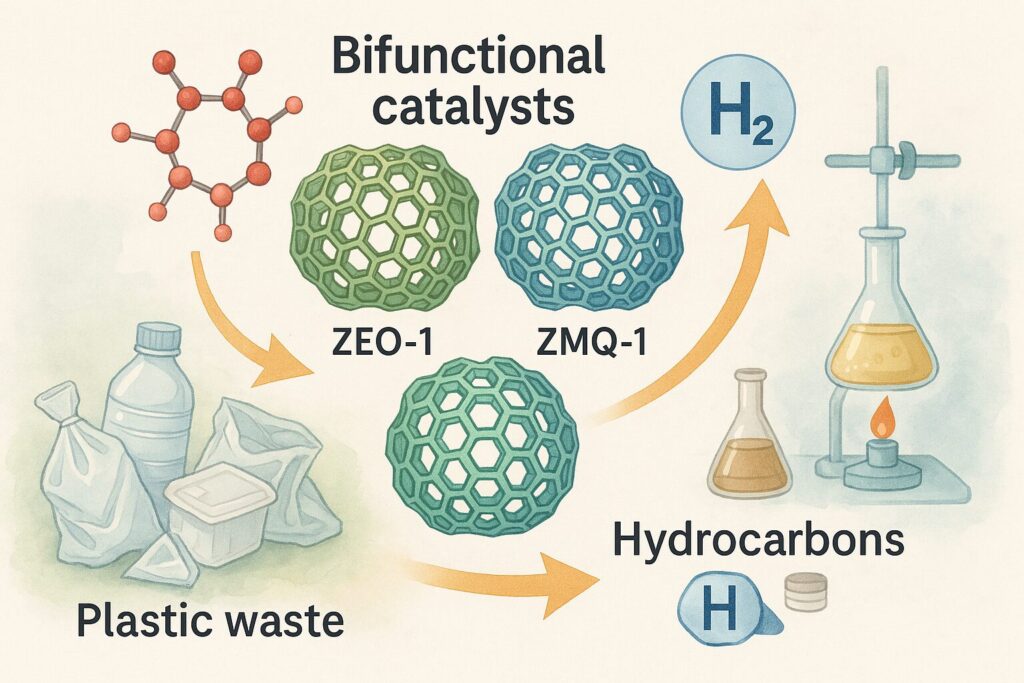Development of extra-large pores zeolite catalysts for plastic wastes upgradingDéveloppement des catalyseurs zéolithiques à extra-large pores pour la valorisation des déchets plastiques

Description
Plastique wastes currently represent a major ecological challenge due to their non-biodegradability. Meanwhile, the demand for hydrogen, a clean energy carrier, continues to grow in response to the energy needs of our society as it gradually moves towards decarbonizing energy sources to reduce the greenhouse gas emissions and mitigate global warming.
There are numerous methods for plastic wastes upgrading, such as mechanical recycling, pyrolysis, gasification, and other unconventional alternatives like photo and bio-microbial degradation. Among these methods, catalytic pyrolysis using zeolite catalysts is garnering increasing interest and is widely studied in the literature. In LCS we aim to develop zeolite-based catalysts with extra-large pores for plastic wastes upgrading. Recently, new zeolitic structures with extra-large pores that surpass the conventional porosity size of zeolites have been discovered; examples include ZEO-1.[1] with a channel opening of 1.4 nm and ZMQ-1[2] with a channel opening reaching up to 2.3 nm. These new structures could serve as more effective and selective catalysts for plastic upgrading. The main objective of this thesis involves developing new bifunctional catalysts based on ZEO-1 and ZQM-1 for producing hydrogen and value-added hydrocarbons from plastic wastes. The catalysts prepared in LCS will be thoroughly characterized using classical and advanced characterization methods available at LCS (XRD, TGA, Nitrogen sorption, solid state NMR, IR, etc…) before being studied in plastic pyrolysis. Polyethylene and polypropylene will be chosen as model molecules before moving to real feedstocks tests
Required Skills
- Deep knowledge in catalysis (heterogeneous or homogeneous)
- Deep knowledge in one of these fields: inorganic chemistry, sol-gel synthesis, physico-chemical characterization techniques such as (XRD, SEM, DLS, N2 sorption, etc… )
- Good level of English (speaking and writing)
Application form must include
- A detailed resume and a motivation letter
- Detailed exam results for M1 and M2
- Two references: the name and contact details of at least two persons who could be contacted
The application form should be sent to louwanda.lakiss@ensicaen.fr
N.B. subject to funding availability
References
[1] M. Fahda, J. Fayek, E. Dib, H. Cruchade, N. Pichot, N. Chaouati, L. Pinard, P. S. Petkov, G. N. Vayssilov, A. Mayoral, B. Witulski, L. Lakiss, V. Valtchev, Chem. Mater. 2024, 36, 5405–5421.
[2] P. Lu, J. Xu, Y. Sun, R. Guillet-Nicolas, T. Willhammar, M. Fahda, E. Dib, B. Wang, Z. Qin, H. Xu, J. Cho, Z. Liu, H. Yu, X. Yang, Q. Lang, S. Mintova, X. Zou, V. Valtchev, Nat. 2024 6368042 2024, 636, 368–373.
